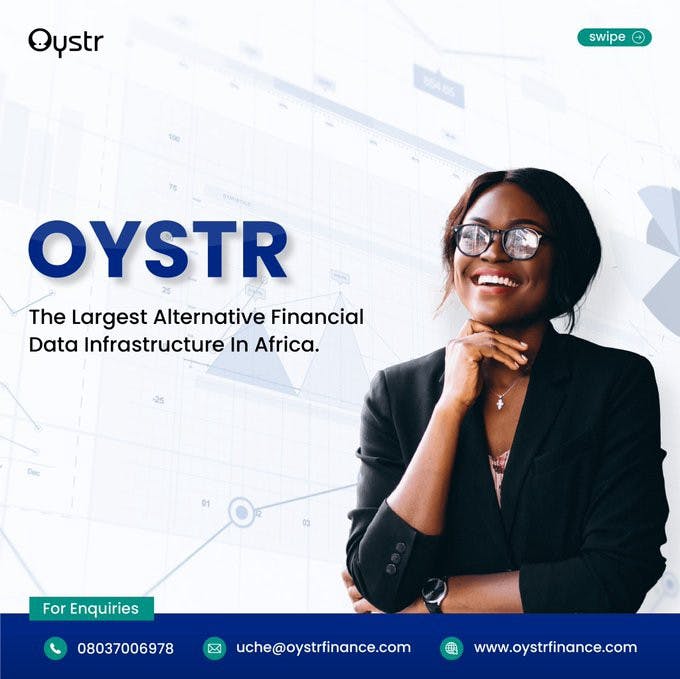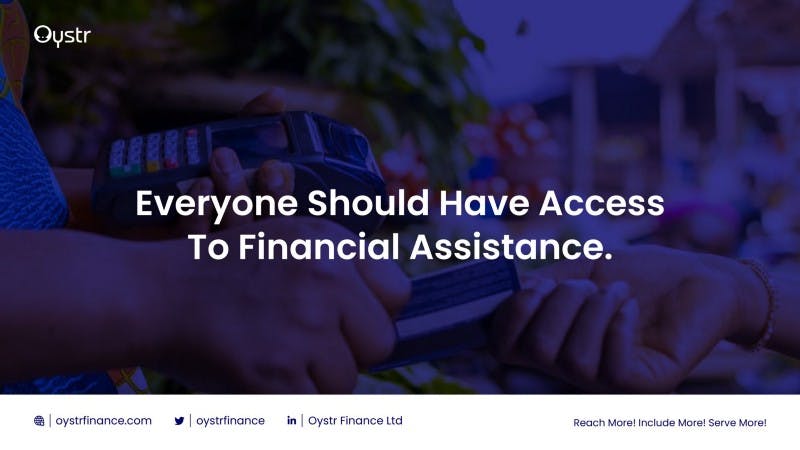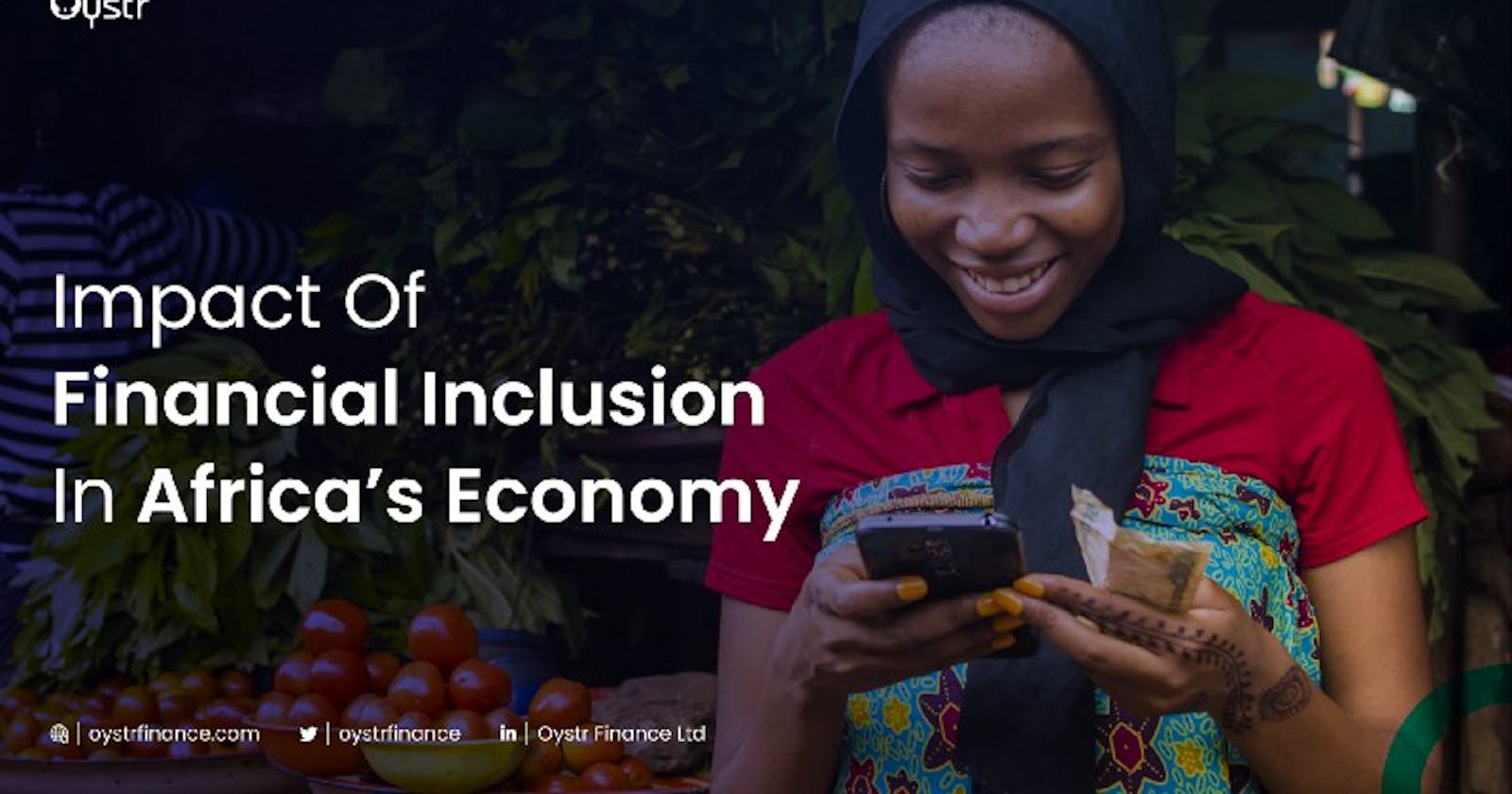Only one of three adults in sub-Saharan Africa has access to financial services. Africa’s underserved population of about 95 million people consists of underprivileged groups such as rural residents, women, and low-income families. The majority of these people are involuntarily excluded from the formal financial system, even though they particularly require basic financial services. Hence, they depend on informal, alternative sources for savings, credit, payment, and insurance.
Impact of Financial Inclusion in Africa’s Economy
According to Nigeria’s National Financial Inclusion Strategy, “Financial inclusion is achieved when adults have easy access to a broad range of formal financial services that meet their needs and are provided at an affordable cost.” The impacts of financial inclusion on economic growth are multi-faceted and far-reaching. Particularly in Africa, experts identify financial inclusion as a catalyst to achieving eight of seventeen sustainable development goals (SDGs). Financial inclusion potentially facilitates poverty eradication, food security, good health, quality education, gender equality, inclusive economic growth, innovation, and sustainable industrialization.
Financial Inclusion Strategies in Africa
Serving Africa’s underserved population maintains no one-size-fits-all solution. The possibility of financial inclusion hinges on the deployment of various strategies to drive the incorporation of every individual and business into the economy. Several African countries have been commended for their progress toward achieving an inclusive financial system.
The following strategies serve as key tools for including the financially unbanked and underbanked in Africa;
Formulation of National Financial Inclusion Strategies (NFIS)
Different African countries published their national financial inclusion strategies (nine in 2015), with even more countries in formulation stages. According to members of the AFI Financial Inclusion Strategy Peer Learning Group (FISPLG), a national financial inclusion strategy is a comprehensive public document that illustrates a strategy developed at the national level to systematically accelerate financial inclusion. The formulation and knowledge of national financial inclusion strategies have considerably facilitated the adoption of the right policies and procedures in NFIS across African nations.
Digital Technology and FinTech
As a result of digital technology and FinTech innovations, several people obtained access to financial services in Africa. To drive financial inclusion, Africa launched and increasingly adopts the application of digital technologies to financial systems.
These innovations include mobile money, digital lending, digital banking, FiDaaS, etc. Following the successful acceptance of mobile money in inclusive finance, digital lending in many forms also transformed financial services.
Fintech innovations such as FiDaaS help individuals to create financial identities so that they can access financial services. Financial services providers in African countries also adopted biometric identification to serve illiterate and disabled populations.
The African Digital Financial Inclusion Facility (ADFI), established to address the barriers to the growth and adoption of digital financial services, is another strategy formulated to foster financial inclusion.

Agency Banking
Across Africa, many banks employ agency banking to promote financial inclusion and support digital banking. Agent banking provides affordable, quick, and credible transactions, including savings, credit, and insurance in rural and urban areas without physical bank infrastructure.
Financial Literacy Services
Financial education initiatives targeted especially at underserved populations, raise awareness about services like savings, credit, insurance, and digital payments. This encourages voluntary participation in financial activities within the formal economy. The resulting increase in demand for financial products and services promotes inclusion.
Inclusive Regulatory Guidelines
African countries incorporate inclusiveness into their legal policies, regulations, and standards. In Africa, players in the Fintech industry now adopt regulatory sandboxes with financial inclusion as the focus. It helps to encourage innovation, promote partnerships, boost the market, and inform inclusive regulations.
Infrastructural Development
Infrastructural development and technological adoption consolidate the impact of financial inclusion on economic growth. The development of physical and especially digital infrastructure is one of the strategies employed by African countries to further push financial inclusion on the continent.
Ubiquitous Acceptable Payment Systems
The payment aspect of financial inclusion is noteworthy. Access to ubiquitous, efficient, and secure acceptable retail payment systems and services by underserved individuals and businesses drives financial inclusion.
This strategy can increase the quality of financial access an individual has on a continental and global scale.
Alternative Data
Alternative data will provide financial institutions with the opportunity to fill in a missing piece of the puzzle in their borrower profile. With more financial institutions leveraging alternative data, it will become easier to expand their customer base and begin to serve the underserved.
Alternative data opens up new opportunities for growth and innovation in new markets. Oystr offers the largest alternative data infrastructure for financial institutions. Visit us to get started

Choose Oystr Finance
Effects of Financial Inclusion on Africa’s Economy
Financial inclusion advances in the continent due to the growth of the inclusive finance strategies highlighted above. Financial inclusion produces ripple effects on the economic ebbs of a region. The multifaceted impacts cut across all the different parts of the continent’s economic health and well-being of its citizens. Some of the effects of financial inclusion on Africa’s economy include the following:
Increased Participation in the Economy
The takeoff and expansion of digital financial services in Africa produced a remarkable increase in financial access across the continent. Presently, almost 50% of individual digital financial service users originate from Africa. With more people enjoying access to formal financial services, the number of people contributing to the development of the economy also increases.
Financial inclusion accelerates inclusive growth and development. The increased access to financial services facilitates the participation of economic players in long-term investment activities. It intensifies finance consumption and investment, thereby raising the degree of economic activity in the continent. Financial access to services other than basic deposits and withdrawals provides individuals with resources to participate in the economy. For instance, credit/insurance access helps individuals start and expand businesses, and invest in health and education, thus contributing to GDP.
Bridging Socio-economic Gaps (Income and Gender Inequality)
Financial inclusion plays an important role in social inclusion, particularly regarding income and gender. Financial inclusion helps break biases and create advancement opportunities for disadvantaged groups in Africa. The underserved in Africa largely consist of women and the poor. Gender and income inequality voluntarily and involuntarily exclude several individuals from the mainstream financial system. Owing to this, the World Bank specified its objectives to reduce income inequality in order to achieve poverty eradication.
Financial inclusion also serves disabled groups who are victims of gross social and economic discrimination and inequality. Recently, Mastercard launched inclusive cards with geometric notches for blind and partially-sighted persons. Through such initiatives, the extension of financial access bridges financial gaps between the disabled and more privileged groups in Africa.
Supporting MSMEs
Many African economies rest on the pillar of Micro, small, and medium-sized enterprises (MSMEs). Financial inclusion increases the access of these MSMEs to capital, which facilitates expansions and employment creation rapidly. This results in favorable general economic outputs. Digital lending platforms and simplified banking services now allow individuals and businesses to obtain loans over short and extended periods.
These Non-Financial Banking Institutes (NFBIs) provide easier online loan application processes, agreement terms, and competitive interest rates. They address SME challenges through digitization and advanced analytics and create seamless credit and scoring models. Additionally, banks rose to the challenge to offer credit services that include the underbanked.
Consequently, SMEs can presently enjoy frictionless and cost-effective digital onboarding and merchant payment digitization.
Agricultural Development
Agricultural productivity remains under-tapped in many African countries as a strategy for sustainable development and economic growth. Financial inclusion gives smallholder farmers — who are mostly in rural areas, access to credit and insurance. This grants the farmers access to funds for agricultural input. Financial access provides resources for withstanding the risks and upfront capital involved in enhancing agricultural productivity through innovation and investment. In addition to improving the economy, it reduces poverty, malnutrition, and food insecurity.
Financial Stability and Economic Growth
Financial stability describes the resistance of major financial markets and the financial institution system of a state to economic shocks. The financial services sector retains its ability to conduct payments, intermediate funds, and manage risks– a major concern in African economies. Financial inclusion has been identified as an impetus for financial stability in Africa, e.g. through private sector domestic credit.
African countries confront the challenge of facilitating inclusive and sustainable growth, especially with the recent change in economic course globally. Financial inclusion promotes rapid and equitable macro-economic growth. Africa’s large informal financial sector acquires significant amounts of funds that bypass the formal financial system. Their inclusion into the formal economy will make more funds available to serve more people on the continent.
Poverty Alleviation
By 2030, the World Bank intends to end extreme poverty and increase the shared wealth of the bottom 40% of the population in each country. Financial inclusion draws enormous interest due to its potential to eradicate poverty and alleviate income inequality in Africa and globally.
It helps individuals, families, and businesses gain enhanced access to financial resources for meeting daily needs, saving, investing, and creating wealth.
The United Nations Commission on International Trade Law (UNCITRAL) identifies financial inclusion as a crucial part of reaching and helping individuals in extreme poverty. Some experts claim that financial inclusion does not individually reduce poverty. However, they agree that it significantly increases income and reduces poverty as part of a system or combined strategy.

Thriving FinTech Industry
FinTech stands as one of the strongest pillars of financial inclusion in Africa. In 2021, Fintech startups raised $3.03 billion in disclosed funding rounds. The focus on financial inclusion in Africa, even from a global standpoint, actively persuades investment in its growing fintech industry.
Fintech innovations appeal better to key players and underserved customers because they present more inclusive solutions than traditional financial institutions.
In response, Fintech firms create superior offers across the value chain to handle customer pain points. This makes them the first point of call for affordable payments, quick loans, flexible savings, and investments. Smartphone penetration, youthful population, and regulatory drive towards financial inclusion and cashless transactions unwrap significant opportunities for fintech across Africa.
Better Financial Service Delivery
Financial inclusion gears financial service delivery in Africa toward customer-centred operations. It entails the quality, not just quantity, of accessible financial services and products. The clamor for financial inclusion across the continent compels banks and other financial institutions to improve their services and products. More so, financial inclusion increases the competitiveness among banks, traditional and non-traditional financial institutions. Banks and financial institutions presently strive to provide inclusive initiatives and quality services to maintain an advantage in shifting market trends. As a result, customers, especially the underserved, now receive quality financial service and product delivery from these institutions.
Final Note
The impacts of financial inclusion dive deep into the cores of Africa’s economy in the short and long run. Banks, financial institutions, fintech firms, regulators, and governments continue in the pursuit of inclusive growth.
Financial inclusion, being a major tool in achieving their goal, deserves the interest it garnered in the last few years. However, more work remains to be done by stakeholders and key players in the financial market. The potential outcomes of achieving financial inclusion are enormously beneficial to the economy and overall quality of life in Africa. From better financial service delivery to poverty alleviation, financial inclusion affects individuals, families, businesses, industries, and nations.

